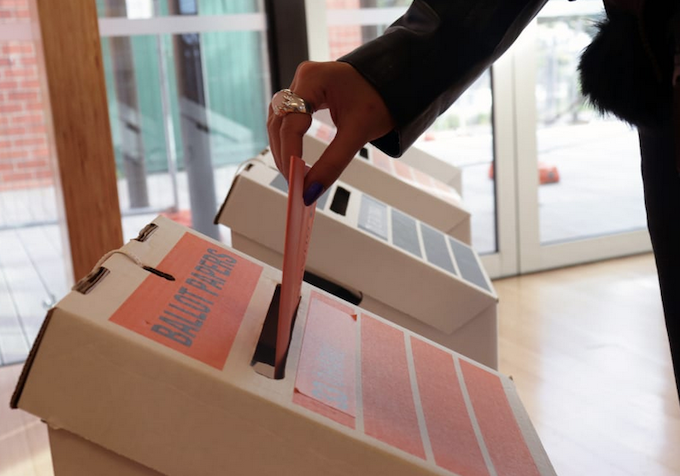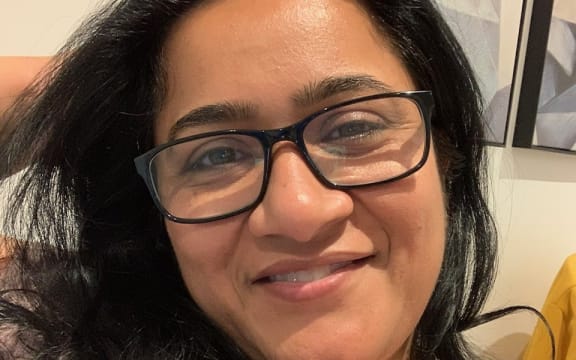
By Blessen Tom, RNZ journalist, and Liu Chen , RNZ journalist, for IndoNZ
The upcoming general election in Aotearoa New Zealand is poised to witness an unprecedented influx of around 250,000 first-time voters.
Data from the Electoral Commission shows that around 60,000 individuals will be eligible to vote for the first time this year after turning 18 since the 2020 election.
However, a more sizeable chunk of voters is expected to come from the roughly 200,000 individuals who will be eligible to vote for the first time after being issued fast-track residency visas in 2021.

Forty-nine-year-old Deepa Tripathi Chaturvedi is one such voter.
Having arrived in New Zealand in 2017 after a 20-year career as a broadcast journalist in India, Chaturvedi is looking forward to voting for the first time outside of India.

“I’m really excited to vote,” she says. “It’s my first time voting outside India. Secondly, I’d really like to see a change.”
Chaturvedi is concerned about the mounting cost of living in New Zealand, describing it as an increasingly arduous endeavor.
“Living in New Zealand is becoming incredibly difficult,” she says.
Home hopes look dim
Despite her reasonably steady income, the prospect of being able to purchase a home of her own looks dim.
“I believe in having my own place, but I just can’t afford it,” she says.
Chaturvedi is also concerned about the government’s immigration policies.
“I think it’s important to value your migrants and the current policies don’t reflect that,” she says.
Chaturvedi understands the importance of participating in the election.
Although Chaturvedi is unfamiliar with New Zealand’s mixed member proportional (MMP) electoral system, she wishes to educate herself about it before voting.
Chaturvedi also draws comparisons between voting in India and New Zealand.
Long queues in India
“There are voting booths in India I think every 2km, so it’s very convenient,” she says. “But the queues can be quite long. ”
Unlike New Zealand, which allows advance votes to be submitted, voters can only cast their ballots on election day in India.
She hopes that she won’t have to stand in long queues when she votes in Auckland for the upcoming October election.

Aravind Narayan Suresh, a 28-year-old IT professional and 2021 resident visa holder, shares Chaturvedi’s excitement about the upcoming election.
Having migrated to New Zealand as a student, Suresh is eager to take part in the democratic process once again.
“I have only voted in India and, now that I have an opportunity here, I’d love to participate in the democratic process again,” he says.
His optimism is tempered by the economic challenges he currently faces, including the high cost of living and petrol prices.
“I have my wife over here and I can’t support her with one job, so I’m thinking of doing two,” he says.
Awaiting a work visa
Suresh’s wife is a civil engineer but cannot work in New Zealand because she is still waiting to receive a work visa.
“We have been waiting for seven months,” he says.
Suresh understands his right to vote gives him an opportunity to effect change – whether his preferred choices win or lose.
He also emphasizes the importance of diverse and inclusive representation among candidates in Parliament, believing it reflects the values of the community.
“I think it’s really important to see representatives of the community at the parliament.”
Like Chaturvedi, Suresh is also educating himself about New Zealand’s MMP electoral system but says he has found the overall enrollment process to be relatively straightforward.

Jaikrishna Anil Kanmani, another first-time voter, is looking forward to the election with a touch of nostalgia for the vibrant electoral atmosphere in India.
NZ elections ‘a little dull’
“I feel like the elections in New Zealand are a little dull compared to India,” he says. “It’s a public holiday (in India) and everybody is on the streets.”
He describes New Zealand’s MMP system as confusing and wishes to learn more about the mechanics of it as the election draws near.
“There are members in Parliament who didn’t win their electorates,” he says. “That seemed weird at first to me.”
He says he’s learning more about the electoral system to better understand how it all works.
Concerns about New Zealand’s housing crisis resonate with Kanmani, prompting him to dismiss the idea of purchasing a home due to exorbitant costs.
“I’ve completely dropped the idea of buying a house,” he says. “With the current living costs and the wages, we earn, there’s no way I would be able to put a down payment for a house.”

Serena Wei, who arrived in New Zealand from China in 2018, confesses to being overwhelmed by the array of political parties and candidates.
“I’m still a little confused now,” Wei says. “On the day of the general election, should I vote for a political party or a person? Because I have never experienced it, and I don’t know how to vote.”
As a mother of two, she worries about the country’s education system and its recent reforms.
“The current reforms make the curriculum and exams less difficult,” she says. “If everyone is moving forward, our country is stagnant, and we may lose touch with the progressing countries.”
Emma Chan has recently obtained her New Zealand residency and is looking forward to the election.
“I believe that actively engaging in democratic voting is a fundamental responsibility as a member of the community, contributing to both my own future and the collective well-being of everyone,” Chan says, speaking on condition of using a pseudonym to protect her identity.
Chan highlights the inherent relationship between key issues such as safety, economic development, education and race relations. She emphasises the government’s role in formulating holistic, long-term policies to address these concerns.
Snowee Jiang, who has previously volunteered for elections but has never voted, wants to vote this year to have a say on social issues.
Jiang, who received the fast-track residency visa in 2021, seeks genuine representation in elected officials rather than a political spectacle. She also urges greater Chinese voter participation through enhanced awareness campaigns.
“I hope that the Chinese can increase the proportion of voting,” she says. “Many people will not vote, and many people don’t care. I hope there will be more publicity in this regard.”
According to the Electoral Commission, 3,871,418 Kiwis are eligible to vote on both the general and Māori rolls in this year’s election and, as of August 2023, about 88 percent had already enrolled.
Advance voting starts on October 2, and election day is Saturday, October 14.
Official results for the general election will be declared on November 3.
This article is republished under a community partnership agreement with RNZ.












































